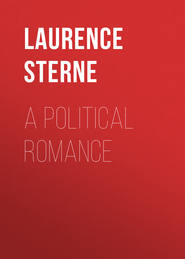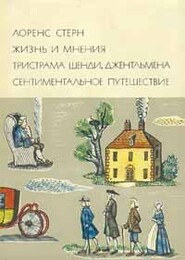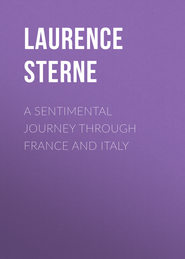По всем вопросам обращайтесь на: info@litportal.ru
(©) 2003-2025.
✖
The Life and Opinions of Tristram Shandy, Gentleman
Настройки чтения
Размер шрифта
Высота строк
Поля
Now let us go back to my brother's death.
Philosophy has a fine saying for every thing.—For Death it has an entire set; the misery was, they all at once rushed into my father's head, that 'twas difficult to string them together, so as to make any thing of a consistent show out of them.—He took them as they came.
''Tis an inevitable chance—the first statute in Magna Charta—it is an everlasting act of parliament, my dear brother,—All must die.
'If my son could not have died, it had been matter of wonder,—not that he is dead.
'Monarchs and princes dance in the same ring with us.
'—To die, is the great debt and tribute due unto nature: tombs and monuments, which should perpetuate our memories, pay it themselves; and the proudest pyramid of them all, which wealth and science have erected, has lost its apex, and stands obtruncated in the traveller's horizon.' (My father found he got great ease, and went on)—'Kingdoms and provinces, and towns and cities, have they not their periods? and when those principles and powers, which at first cemented and put them together, have performed their several evolutions, they fall back.'—Brother Shandy, said my uncle Toby, laying down his pipe at the word evolutions—Revolutions, I meant, quoth my father,—by heaven! I meant revolutions, brother Toby—evolutions is nonsense.—'Tis not nonsense—said my uncle Toby.—But is it not nonsense to break the thread of such a discourse upon such an occasion? cried my father—do not—dear Toby, continued he, taking him by the hand, do not—do not, I beseech thee, interrupt me at this crisis.—My uncle Toby put his pipe into his mouth.
'Where is Troy and Mycenae, and Thebes and Delos, and Persepolis and Agrigentum?'—continued my father, taking up his book of post-roads, which he had laid down.—'What is become, brother Toby, of Nineveh and Babylon, of Cizicum and Mitylenae? The fairest towns that ever the sun rose upon, are now no more; the names only are left, and those (for many of them are wrong spelt) are falling themselves by piece-meals to decay, and in length of time will be forgotten, and involved with every thing in a perpetual night: the world itself, brother Toby, must—must come to an end.
'Returning out of Asia, when I sailed from Aegina towards Megara,' (when can this have been? thought my uncle Toby,) 'I began to view the country round about. Aegina was behind me, Megara was before, Pyraeus on the right hand, Corinth on the left.—What flourishing towns now prostrate upon the earth! Alas! alas! said I to myself, that man should disturb his soul for the loss of a child, when so much as this lies awfully buried in his presence—Remember, said I to myself again—remember thou art a man.'—
Now my uncle Toby knew not that this last paragraph was an extract of Servius Sulpicius's consolatory letter to Tully.—He had as little skill, honest man, in the fragments, as he had in the whole pieces of antiquity.—And as my father, whilst he was concerned in the Turkey trade, had been three or four different times in the Levant, in one of which he had stayed a whole year and an half at Zant, my uncle Toby naturally concluded, that, in some one of these periods, he had taken a trip across the Archipelago into Asia; and that all this sailing affair with Aegina behind, and Megara before, and Pyraeus on the right hand, &c. &c. was nothing more than the true course of my father's voyage and reflections.—'Twas certainly in his manner, and many an undertaking critic would have built two stories higher upon worse foundations.—And pray, brother, quoth my uncle Toby, laying the end of his pipe upon my father's hand in a kindly way of interruption—but waiting till he finished the account—what year of our Lord was this?—'Twas no year of our Lord, replied my father.—That's impossible, cried my uncle Toby.—Simpleton! said my father,—'twas forty years before Christ was born.
My uncle Toby had but two things for it; either to suppose his brother to be the wandering Jew, or that his misfortunes had disordered his brain.—'May the Lord God of heaven and earth protect him and restore him!' said my uncle Toby, praying silently for my father, and with tears in his eyes.
–My father placed the tears to a proper account, and went on with his harangue with great spirit.
'There is not such great odds, brother Toby, betwixt good and evil, as the world imagines'—(this way of setting off, by the bye, was not likely to cure my uncle Toby's suspicions).—'Labour, sorrow, grief, sickness, want, and woe, are the sauces of life.'—Much good may do them—said my uncle Toby to himself.—
'My son is dead!—so much the better;—'tis a shame in such a tempest to have but one anchor.
'But he is gone for ever from us!—be it so. He is got from under the hands of his barber before he was bald—he is but risen from a feast before he was surfeited—from a banquet before he had got drunken.
'The Thracians wept when a child was born,'—(and we were very near it, quoth my uncle Toby,)—'and feasted and made merry when a man went out of the world; and with reason.—Death opens the gate of fame, and shuts the gate of envy after it,—it unlooses the chain of the captive, and puts the bondsman's task into another man's hands.
'Shew me the man, who knows what life is, who dreads it, and I'll shew thee a prisoner who dreads his liberty.'
Is it not better, my dear brother Toby, (for mark—our appetites are but diseases,)—is it not better not to hunger at all, than to eat?—not to thirst, than to take physic to cure it?
Is it not better to be freed from cares and agues, from love and melancholy, and the other hot and cold fits of life, than, like a galled traveller, who comes weary to his inn, to be bound to begin his journey afresh?
There is no terrour, brother Toby, in its looks, but what it borrows from groans and convulsions—and the blowing of noses and the wiping away of tears with the bottoms of curtains, in a dying man's room.—Strip it of these, what is it?—'Tis better in battle than in bed, said my uncle Toby.—Take away its hearses, its mutes, and its mourning,—its plumes, scutcheons, and other mechanic aids—What is it?—Better in battle! continued my father, smiling, for he had absolutely forgot my brother Bobby—'tis terrible no way—for consider, brother Toby,—when we are—death is not;—and when death is—we are not. My uncle Toby laid down his pipe to consider the proposition; my father's eloquence was too rapid to stay for any man—away it went,—and hurried my uncle Toby's ideas along with it.—
For this reason, continued my father, 'tis worthy to recollect, how little alteration, in great men, the approaches of death have made.—Vespasian died in a jest upon his close-stool—Galba with a sentence—Septimus Severus in a dispatch—Tiberius in dissimulation, and Caesar Augustus in a compliment.—I hope 'twas a sincere one—quoth my uncle Toby.
–'Twas to his wife,—said my father.
Chapter 3.IV
—And lastly—for all the choice anecdotes which history can produce of this matter, continued my father,—this, like the gilded dome which covers in the fabric—crowns all.—
'Tis of Cornelius Gallus, the praetor—which, I dare say, brother Toby, you have read.—I dare say I have not, replied my uncle.—He died, said my father as…—And if it was with his wife, said my uncle Toby—there could be no hurt in it.—That's more than I know—replied my father.
Chapter 3.V
My mother was going very gingerly in the dark along the passage which led to the parlour, as my uncle Toby pronounced the word wife.—'Tis a shrill penetrating sound of itself, and Obadiah had helped it by leaving the door a little a-jar, so that my mother heard enough of it to imagine herself the subject of the conversation; so laying the edge of her finger across her two lips—holding in her breath, and bending her head a little downwards, with a twist of her neck—(not towards the door, but from it, by which means her ear was brought to the chink)—she listened with all her powers:—the listening slave, with the Goddess of Silence at his back, could not have given a finer thought for an intaglio.
In this attitude I am determined to let her stand for five minutes: till I bring up the affairs of the kitchen (as Rapin does those of the church) to the same period.
Chapter 3.VI
Though in one sense, our family was certainly a simple machine, as it consisted of a few wheels; yet there was thus much to be said for it, that these wheels were set in motion by so many different springs, and acted one upon the other from such a variety of strange principles and impulses—that though it was a simple machine, it had all the honour and advantages of a complex one,—and a number of as odd movements within it, as ever were beheld in the inside of a Dutch silk-mill.
Amongst these there was one, I am going to speak of, in which, perhaps, it was not altogether so singular, as in many others; and it was this, that whatever motion, debate, harangue, dialogue, project, or dissertation, was going forwards in the parlour, there was generally another at the same time, and upon the same subject, running parallel along with it in the kitchen.
Now to bring this about, whenever an extraordinary message, or letter, was delivered in the parlour—or a discourse suspended till a servant went out—or the lines of discontent were observed to hang upon the brows of my father or mother—or, in short, when any thing was supposed to be upon the tapis worth knowing or listening to, 'twas the rule to leave the door, not absolutely shut, but somewhat a-jar—as it stands just now,—which, under covert of the bad hinge, (and that possibly might be one of the many reasons why it was never mended,) it was not difficult to manage; by which means, in all these cases, a passage was generally left, not indeed as wide as the Dardanelles, but wide enough, for all that, to carry on as much of this windward trade, as was sufficient to save my father the trouble of governing his house;—my mother at this moment stands profiting by it.—Obadiah did the same thing, as soon as he had left the letter upon the table which brought the news of my brother's death, so that before my father had well got over his surprise, and entered upon his harangue,—had Trim got upon his legs, to speak his sentiments upon the subject.
A curious observer of nature, had he been worth the inventory of all Job's stock—though by the bye, your curious observers are seldom worth a groat—would have given the half of it, to have heard Corporal Trim and my father, two orators so contrasted by nature and education, haranguing over the same bier.
My father—a man of deep reading—prompt memory—with Cato, and Seneca, and Epictetus, at his fingers ends.—
The corporal—with nothing—to remember—of no deeper reading than his muster-roll—or greater names at his fingers end, than the contents of it.
The one proceeding from period to period, by metaphor and allusion, and striking the fancy as he went along (as men of wit and fancy do) with the entertainment and pleasantry of his pictures and images.
The other, without wit or antithesis, or point, or turn, this way or that; but leaving the images on one side, and the picture on the other, going straight forwards as nature could lead him, to the heart. O Trim! would to heaven thou had'st a better historian!—would!—thy historian had a better pair of breeches!—O ye critics! will nothing melt you?
Chapter 3.VII
—My young master in London is dead? said Obadiah.—
—A green sattin night-gown of my mother's, which had been twice scoured, was the first idea which Obadiah's exclamation brought into Susannah's head.—Well might Locke write a chapter upon the imperfections of words.—Then, quoth Susannah, we must all go into mourning.—But note a second time: the word mourning, notwithstanding Susannah made use of it herself—failed also of doing its office; it excited not one single idea, tinged either with grey or black,—all was green.—The green sattin night-gown hung there still.
–O! 'twill be the death of my poor mistress, cried Susannah.—My mother's whole wardrobe followed.—What a procession! her red damask,—her orange tawney,—her white and yellow lutestrings,—her brown taffata,—her bone-laced caps, her bed-gowns, and comfortable under-petticoats.—Not a rag was left behind.—'No,—she will never look up again,' said Susannah.
We had a fat, foolish scullion—my father, I think, kept her for her simplicity;—she had been all autumn struggling with a dropsy.—He is dead, said Obadiah,—he is certainly dead!—So am not I, said the foolish scullion.
–Here is sad news, Trim, cried Susannah, wiping her eyes as Trim stepp'd into the kitchen,—master Bobby is dead and buried—the funeral was an interpolation of Susannah's—we shall have all to go into mourning, said Susannah.
I hope not, said Trim.—You hope not! cried Susannah earnestly.—The mourning ran not in Trim's head, whatever it did in Susannah's.—I hope—said Trim, explaining himself, I hope in God the news is not true. I heard the letter read with my own ears, answered Obadiah; and we shall have a terrible piece of work of it in stubbing the ox-moor.—Oh! he's dead, said Susannah.—As sure, said the scullion, as I'm alive.
I lament for him from my heart and my soul, said Trim, fetching a sigh.—Poor creature!—poor boy!—poor gentleman!
–He was alive last Whitsontide! said the coachman.—Whitsontide! alas! cried Trim, extending his right arm, and falling instantly into the same attitude in which he read the sermon,—what is Whitsontide, Jonathan (for that was the coachman's name), or Shrovetide, or any tide or time past, to this? Are we not here now, continued the corporal (striking the end of his stick perpendicularly upon the floor, so as to give an idea of health and stability)—and are we not—(dropping his hat upon the ground) gone! in a moment!—'Twas infinitely striking! Susannah burst into a flood of tears.—We are not stocks and stones.—Jonathan, Obadiah, the cook-maid, all melted.—The foolish fat scullion herself, who was scouring a fish-kettle upon her knees, was rous'd with it.—The whole kitchen crowded about the corporal.
Now, as I perceive plainly, that the preservation of our constitution in church and state,—and possibly the preservation of the whole world—or what is the same thing, the distribution and balance of its property and power, may in time to come depend greatly upon the right understanding of this stroke of the corporal's eloquence—I do demand your attention—your worships and reverences, for any ten pages together, take them where you will in any other part of the work, shall sleep for it at your ease.
I said, 'we were not stocks and stones'—'tis very well. I should have added, nor are we angels, I wish we were,—but men clothed with bodies, and governed by our imaginations;—and what a junketing piece of work of it there is, betwixt these and our seven senses, especially some of them, for my own part, I own it, I am ashamed to confess. Let it suffice to affirm, that of all the senses, the eye (for I absolutely deny the touch, though most of your Barbati, I know, are for it) has the quickest commerce with the soul,—gives a smarter stroke, and leaves something more inexpressible upon the fancy, than words can either convey—or sometimes get rid of.
–I've gone a little about—no matter, 'tis for health—let us only carry it back in our mind to the mortality of Trim's hat—'Are we not here now,—and gone in a moment?'—There was nothing in the sentence—'twas one of your self-evident truths we have the advantage of hearing every day; and if Trim had not trusted more to his hat than his head—he made nothing at all of it.
–'Are we not here now;' continued the corporal, 'and are we not'—(dropping his hat plumb upon the ground—and pausing, before he pronounced the word)—'gone! in a moment?' The descent of the hat was as if a heavy lump of clay had been kneaded into the crown of it.—Nothing could have expressed the sentiment of mortality, of which it was the type and fore-runner, like it,—his hand seemed to vanish from under it,—it fell dead,—the corporal's eye fixed upon it, as upon a corpse,—and Susannah burst into a flood of tears.
Now—Ten thousand, and ten thousand times ten thousand (for matter and motion are infinite) are the ways by which a hat may be dropped upon the ground, without any effect.—Had he flung it, or thrown it, or cast it, or skimmed it, or squirted it, or let it slip or fall in any possible direction under heaven,—or in the best direction that could be given to it,—had he dropped it like a goose—like a puppy—like an ass—or in doing it, or even after he had done, had he looked like a fool—like a ninny—like a nincompoop—it had fail'd, and the effect upon the heart had been lost.











